BACKGROUND
“We generate fears, while we sit, we overcome that by action.”
Dr Henry Link
 Abhishek Srivastava, Senior Legal Manager at Policybazaar Group of Companies, a living example of this. He is a dynamic Corporate Lawyer, a true shining star for all of us. His life is an example where he has shown he is not controlled by his fears, difficult situations.
Abhishek Srivastava, Senior Legal Manager at Policybazaar Group of Companies, a living example of this. He is a dynamic Corporate Lawyer, a true shining star for all of us. His life is an example where he has shown he is not controlled by his fears, difficult situations.
In his career, Abhishek has around 10 years of work experience in multiple domains including Media and Entertainment, FMCG, E-commerce, NBFC, Fintech sector etc. His work mainly included an end to end legal support and advisory including contract management, M&A, IPR, litigation management. He has also worked and handled Trust related matters. Amongst the compliances, he has worked on FSSAI, Drugs and Cosmetics, Legal Metrology and other labour and industrial laws. Currently, providing end to end support to the Fintech portfolio along with the technology arm of the group. His journey to this stage is motivating for all of us.
Professionally and personally, the year 2017 was very difficult times as he was diagnosed with sinus venous thrombosis. He temporarily lost sight and ability to walk. All this had larger professional implications too. This meant that he had to give up his dream job at Aditya Birla Group and take a medical break. The break might have given a personal recovery but professionally challenges were awaiting to test him further. When he got back on his feet, he encountered mostly two sets of people- one, who were not sure if he was medically fit to relaunch himself into the in-house space and others who felt exploiting his situation was justified by offering him roles which were fairly underpaid and not consistent with his experience. But then there were select few who believed in him and gave him the opportunity to relaunch.
The only important factor during these times was his belief in himself, his strength and ability to outperform to any challenge thrown at him and not to give up under any circumstances and the result of his tireless efforts bore fruits which is in front of all of us.
INTERVIEW
Indian Law Watch is in conversation with this inspiring young, energetic corporate lawyer whose journey is an example. Following is our interview with charismatic lawyer, Mr Abhishek Srivastava
1. Could you please briefly share your educational background for our readers?
 Response: I am a BA, LLB (Hons.) in IPR and International Trade and Investment. I graduated from Hidayatullah National Law University in 2010. ACIArb from Chartered Institute of Arbitrators Malaysian Branch.
Response: I am a BA, LLB (Hons.) in IPR and International Trade and Investment. I graduated from Hidayatullah National Law University in 2010. ACIArb from Chartered Institute of Arbitrators Malaysian Branch.
2. How would you describe your journey of 10 years from the corridors of law college to the position of Senior Legal Manager, Policy Bazaar Group of Companies? Whether joining the corporate side of legal practice always in mind or destiny took you all along?
Response: All I ever wanted to do was join the Indian Armed forces. I did my +2 in Biology and applied for CDS. In the two available attempts for SSB, I was conference out once and medical out in the next. I have always had no flare for the bookish knowledge and tend to always rely on the practical side. For the same reason and thanks to the education system, I have always been an average student. This certainly did not go too well with the placements.
The destiny, however, struck when I met with a senior lawyer who had just parted her ways with Fox & Mandal Little and was now taking up retirement. It took a conversation of about 45 min at her residence in Defence Colony for her to refer me to one of her ex-colleagues who was based out of Dubai and looking to recruit the first law officer for their Indian subsidiary. That’s how my in-house journey began.
The journey from Dubai to Kuala Lumpur and then back to India is what shaped me towards finding my feet in the in-house role. Not only did I learn from the best, but the exposure that I got from undertaking these foreign-based assignments is also what contributed in my transformation from “a law graduate” to “a lawyer” and finally to “a business lawyer”.
3. What is the most important turning point of your career and how did you handle it? How far the system was responsive to help you deal with the situation and what was the role of the family.
Response: In the year 2016, all my hard work and resilience paid off when I got the opportunity to work with Ananya Birla and Mrs Neerja Birla. As their Legal Counsel, I have tasked with handling not just the legal affairs of all the entities where either one or both were on the board. With around 7-8 portfolios ranging from E-commerce, NBFC, Media and Entertainment, Education, Trusts etc., I was the single point of contact for all the legal affairs of these entities. This was certainly a dream run. However, here the destiny was a bit dampener. Towards the end of 2017, I started experiencing health issues and medications only made it worse. “Sinus venous thrombosis” is what it is termed and relates to a condition when blood clots in one of the veins of the brain. Tragically, all the neurological functions related to this vein are also affected. In my case, the vein that was clotted related to sight and body balance. I temporarily lost my ability to see and walk or stand. This was certainly the scariest phase of my life as the Doctors were sure about removing the clot but were not sure about the reversal of the neurological affects.
I was hospitalized twice in Hinduja and finally discharged with considerable recovery. All I now had to do was to take medicines and rest till I could get back on my feet. Nobody knew how much time this might take. The process was both emotionally as well as financially draining. More for my wife, who had just started her journey with Cipla Ltd. 9 hours at the office and remaining 15 hours at the hospital. Without any complaints, she stood firm fighting all the odds to support me during my illness and post my recovery.
Once I got back on my feet, I had already realized that the script that I had written for the past several years was forgotten.
People were not willing to give me the opportunity to bounce back and maybe rightfully so. After all, even I was unsure about the extent of the neurological damage that I had suffered due to the illness. I was even unsure whether I was fully fit to join back the profession or whether it was mere desperation on my part to start working again. But the net effect was that my self-confidence started to deteriorate. The result – Glossophobia, Agoraphobia, Depression, Anxiety. It was, yet again, my wife who wo(manned) the fort. She left her job at Cipla and we moved to Gurgaon as with only she working, Mumbai had suddenly become an expensive city.
In all this, the most important lessons of life were learnt by me i.e. patience and humility. I just kept my head down and kept trying. My boy, Joey (Labrador pup) sucked out all negative energies with his smothering kisses and tight hugs. With one aim to find my feet back into the profession, I kept attending interviews, kept dealing with rejections and one fine day all the karma and prayers of my wife did pay off when someone decided to give preference to merit over year gap or medical issues.
4. What is the difference of challenges in corporate practice within a firm from that of in-house counsels?
Response: See, I have never worked in a law firm so I am not the correct person to differentiate between the law firm culture or in-house culture. But in my view, both have their own set of challenges and one must be open enough to accept these as-is. I would never compare what I do with what my colleagues do in a law firm. Law firms have a distinct style of working for their clients and as in-house lawyers are our task to balance it out with the business interests and future aspirations of the Company. But the Law is the same and so is our understanding and interpretation, only the methods of working may differ.
However, there may be one thing that I believe I could not have attained had I working for a law firm, which is exposure in multiple domains like Sports Law, Media and Entertainment, E-commerce, NBFC, Trusts, M&A, Retail, FMCG, Education etc. But again that’s just a matter of perspective.
5. You had a journey with very prestigious organisations, like LCIA as Deputy Registrar, Kuala Lumpur Regional Centre of Arbitration as a case counsel. How would you describe the experience in these arbitration organisation? Was the arbitration practice journey had any relevance in shaping your career as a corporate counsel? Do you see India evolving into an arbitration hub in near future?
Response: The experience in an arbitration institution is very different from in-house practice. Being a part of an arbitration institute would not only give you exposure towards administering of arbitration matters by an institution but would also shape your understanding about the arbitration law as a whole. Administering arbitration caseload gave me exposure to the step by step of an effective arbitration process, drafting effective arbitration clauses for the clients, witnessing the best in the game argue before tribunals, assisting the tribunals and getting the opportunity to learn from some of the highly renowned arbitrators. Being a corporate counsel is altogether a different ball game. But I must admit that carrying the learnings from the disputes that landed up with the institutes and the learnings did help me tremendously in my in-house journey.
India being an arbitration hub is in my view a difficult ask. This perspective has been attained through the experiences attained on both sides of the podium. One by being involved with assisting the tribunals and two by being a prospective client using the arbitration clauses of these institutions. Sometimes it’s not just about a neutral venue, pro-arbitration jurisdictions or court friendly approaches. If such was the case, then in my view Malaysia would have given a stiff competition to Singapore. But having said that I highly admire the work MCIA, Mumbai has been doing over the years. Representing a Company, I feel much more confidence in having an MCIA arbitration clause in my agreements.
6. There are many aspirants in law colleges who desire to become corporate counsel but sometimes they do not get that appropriate initial platform and land up in different practice area altogether. So what is your advice to such aspirants?
Response: This is actually a difficult equation, the solution for which can only be given by the gurus in the field. But in my opinion, it is more for recruiting managers to understand. They should not shy away from giving the opportunity to talented law graduates. Gaining experience has to start somewhere, so let it be from the roots and there is nothing better than recruiting the right talent at the right stage. From what I have noticed in the past that a law graduate who is desperate to get into the in-house practice, is never thankless and if provided with the opportunity and some nurturing would turn out to be a great asset for the team. It is just a matter of spotting the right talent. It is beyond me how some job openings call for applications from fresh law graduates and state the requirement of prior experience in specific fields.
For law graduates who wish to be a part of the in-house teams, my honest suggestion is to start early learning from the time at law school. READING is the best weapon that you will have. So READ, ANALYSE, APPLY.
The sooner you start coming out of the textbook knowledge and start applying the law practice, the broader your perspective will start to become. Start assessing the law as if it was applicable to your own business, try to find gaps/ loopholes, research on these gaps, generate an understanding. Writing quality papers on these issues would not only sharpen your knowledge on the subject but also take you miles at the interview stage. While attending the interviews read a lot about the Company, its road so far and the journey ahead.
Apply your legal knowledge to foresee what challenges the company may face in its future endeavours. While reading judgments/ arbitration awards try to assess what could have been done differently by the losing party to attain a favourable outcome. And finally, make sure to politely bring out all this knowledge in the questions that are being asked.
If you are a lawyer and you are not good with words, then you surely need to be working on your skills.
I believe in every question that is being asked at the interview, you can politely put across your ideas/ views and knowledge about the subject. Try to make the interview into a discussion. Now, this approach needs to be exercised carefully. You do not want to be coming out to be too full of yourself. All you need to do is convince the interviewer that you are a good resource which has knowledge about the sector and with minimal guidance you will be a good resource for the team.
And finally, if you are employed you will need to learn to accept failures. Learn from them and move on. Have an open mind to accept new views/ assignments outside your comfort zone, work doubly hard as your seniors may not have time to handhold you and finally do not be rigid about the law. Try to finds ways and means to support the business, to the extent possible.
7. How do you see is the recognition of corporate counsel in the legal field? What can be done for the training of corporate counsels to make them on par with international best practices?

Response: In my honest opinion, in-house practice is a bit underrated. An assignment done by a law firm can be equally done, effectively and efficiently, by the in-house legal team (barring some work which can only be taken up by law firms). But somehow, comfort has always been outsourcing of legal work to external counsels. In my opinion, this primitive ideology needs a change. And this change has to come from entrepreneurs showing more trust in their legal department, and managers showing more trust in their teams.
For in-house counsels, getting caught into a culture with a 9 to 5 job which pays your bills is very easy. If that, you will not only limit your growth and knowledge but also be transformed from an asset to a liability. You need to keep challenging yourself every day to do better than yesterday. Self-learning is a process which should never stop.
8. Lawyers life is very hectic as compared to what is perceived by masses. How do you maintain a work-life balance? What are your favourite hobbies?
Response: A wise man once told me that “Work-life balance” is a sham. Try making work your life. You will see altogether a different world.
You can work 14-15 hours a day and still have time for your loved ones. After all, you are not just working for yourself. You are working for them equally.
Well!! I don’t completely disagree with what he said. If you love what you do and the people around you, things will automatically fall in place such that you have time for work, for yourself and for your near and dear ones. What I do is that I switch off. When I work I put my heart and soul into it. When I am with my family I do not think about work, unless there is going to be no tomorrow. But you need to be faithful to your “work”, as that is an important factor in the “life” that you have. I love to travel with my wife and my dog, I cook every now and then, watch Netflix on the binge over weekends and try my best not to keep any pendency of work ending Fridays.
9. Who is your ideal in life?
Response: I believe that there is something to be learnt from each and every person you encounter. What you apply is up to you, but every person you meet will provide you with great learning including human nature. For this simple reason, I do not have any ideal in life. I try to learn from everyone I meet. As long as I can do that humility and empathy, I see no necessity of having any ideals in order for me to achieve my aspirations.
10. We read your post on contract drafting. In India, awareness among masses is less and often contract drafting is done even by non-legal professionals based on templates available online. Is contract drafting solely a legal craft? What is the word of caution based on your experience in the area you would like to give to our common readers?
Response: In the simplest words, “Please seek professional help”. A contract forms the basis for any commercial dispute. A poorly drafted or negotiated contact will affect both parties equally. Compensation from one and unnecessary initial legal costs for another. The idea is to establish a long-standing relationship between the parties and not to make it a weapon of abuse or misuse.
11. How encouraging it is for women lawyers to join the corporate legal practice?
Response: In my opinion, there is no classification as a male lawyer or a women lawyer. You are either a good lawyer or you are not. Your gender does not determine your future. It’s your knowledge and hard work which takes you places. Unfortunately, in our society, this may not hold true for everyone and women lawyers have to face their own set of challenges. But I have been fortunate enough to be associated with some great women leaders who fought all the odds and have made a mark in the profession. Let not your gender decide what you are good at. Change the rules as you go along.
12. COVID has changed many things from the way we work-like work from home, virtual courts, meetings etc to the way we think? What do you think is the best work take away from the COVID times for the Indian Legal System?
Response: To start with, COVID has taught us the most important lessons that we had been ignoring for a long time which is never to take anything for granted especially your job. There have been conflicting views on WFH culture. Whilst some of us feel that the phrase “Work-life balance” has been negated, people like me feel that there is nothing better than being at work surrounded by your family. I will admit that initially, it was a bit difficult getting used to this concept. But as time progressed marred by successive lockdowns, I have come to realize that the output, focus and quality have increased significantly with WFH culture. With less opportunity for handholding, a lot of people have gained in coming out of their comfort zones and contributing independently. If this system is indeed retained and followed religiously, I am sure that the system has a lot to gain from it.
13. Which is the most inspiring quote that you always follow in your life. What is the message to the young lawyers?
Response:















Sir,
Great the last words determine your spirituality , the ups and downs of life make men miserable the will power sustain you , good luck ahead sir wish you good and golden health .